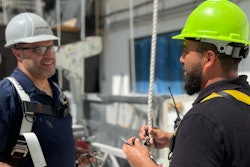Based on what you see and hear in various media outlets, there is a real mess left behind by Hurricanes Harvey and Irma. It’s hard to imagine what residents and business owners in the areas affected are going through.
But no matter how you look at the post-hurricane landscape, we all realize there are not enough resources in those areas to repair and rebuild the cities that were damaged. I’m confident that we will be hearing a big sucking sound representing all the equipment and workers leaving the northern states and heading south. This could be either a good thing or a bad thing depending on how well you plan the perceived work.
Those of you planning to look into work down south have a substantial amount of planning to do to ensure you can make a buck on this venture. You need to at least be able to assess your progress to date and, if need be, pick up your toys and get out of Dodge before you lose your backside.
There is definitely a lot of work to be had, and the pricing should be good, but the efficiency you are accustomed to may be lacking because of the chaos going on down there. Thinking out loud, here are some topics you need to consider before embarking on an expensive move of equipment and manpower to Texas or Florida.
Who Will You Be Working For and Are Funds in Place?
I thought I would start with the biggest elephant in the room, and that is who are you contracting with to do the work? This is a big question. Do they have the capital available to fund the work? Are they waiting for a payment from an insurance company? Are they insured and bonded?
No matter who you are working with or for, some extra attention has to be paid to determine that the financing is in place and, if it is, that it will not be diverted to start another project mid-stream. There is no doubt that the financing process will not be a smooth one. You don’t want to run into jobs that are still in the process of getting funding.
How Will You Manage Equipment and Supplies?
These are not normal markets you will be working in. Supplies (if there are any left) will be hard to come by and you can expect the pricing to be set to the market. So, where do you get what you need to do the work? You could bring inventory with you. Or you can have a supply chain running from outlying cities and distribution points that bring in daily or weekly shipments, with the additional cost included in your bid estimate.
In terms of equipment, you can bring and fix your own. (I doubt you will find working rental units available for anything close to what you’re paying back home.) However, bringing your own equipment means transportation and maintenance costs. Who is going to fix them? If you bring a tech with you, he/she will need shop supplies, tools and a place to do the work, which may be tough to find. Is there any doubt that repair work lead times will be in the 30+ day column?
Is Additional Coverage or Licensing Required?
If you’re planning to work outside of your ordinary sphere of influence, determine if you need to be licensed in the area you plan to work in. Will you need bonding?
I suspect you will also need to have a chat with your insurance agent and inform him/her of what you plan to do and where you plan to do it. Will you have to adjust your coverage limits? Are there any additional risks you need to cover? Will workman’s comp rates be different? What you don’t want to do is increase your risk quotient and expose your company simply to acquire additional revenue that is not material to your annual revenues.
What Is the Potential Tax Burden?
You didn’t think I would forget about the potential tax burden associated with work in “new” states where you have now created a “nexus” for yourself. There is potential income tax, sales tax, use tax, personal property tax — the list goes on and on. And you can bet the farm that every state will be geared up to find you and tax you. How else are they going to make up for the lost revenue they’re incurring because local residents and businesses are not working or able to do business?
A call to an accountant who knows state and local taxes, and has friends in the states where you plan to work, is almost certainly a “must.”
Give Thought to Planning and Managing
All these issues will be time consuming and costly. In addition, you are expected to:
- manage your team under very tough conditions,
- keep track of your budget and expenses,
- provide the necessary paperwork to get paid
- and, above all, make this endeavor profitable for both your workers and your company.
The citizens in Texas and Florida need your expertise to help restore the area and it’s great that you are considering going down there. Yet, no matter who you are or how big your company is, taking on disaster recovery work requires more thought and planning than a typical job outside of your standard work area. Make sure you do your homework and get the help you need to properly plan and manage the work.


















